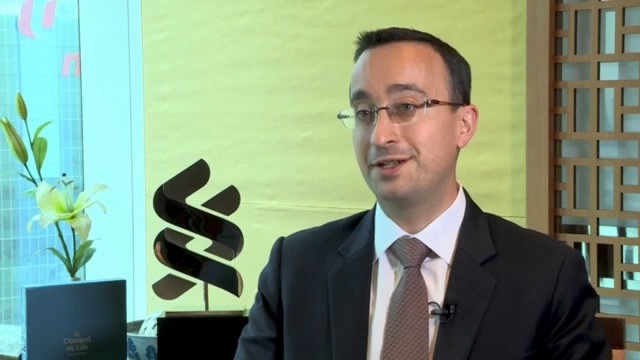
Biz Analysis
19:11, 21-Jan-2019
China EconTalk: Standard Chartered economist predicts China's GDP growth at 6.4 percent in 2019
Updated
22:42, 21-Jan-2019
By CGTN's Global business and Miro Lu
03:19

Expert predicts that China's GDP will grow at 6.4 percent in 2019, higher than the IMF's estimate of 6.2 percent, as the world's second-largest economy is grappling with the challenges of a slower growth and damaging trade war.
Standard Chartered bank's global chief economist David Mann suggested that the Chinese government will not resort to any aggressive stimulus measures and will continue minor policy support measures to meet growth targets in 2019, while acknowledging the slowdown of the economy in the country.
"We do believe that China's economy is in the progress of slowing down. There is a cyclical slowing down but there is also a structural slowdown that will come through the 2020s as a result of the demographic drag coming from rapid aging. However, we differ from consensus on what we expect from 2019, where we believe we will still see growth of 6.4 percent. The main reason is that we believe the target of doubling GDP in 2020 versus 2010 will still be met," said Mann.
In a bid to cope with challenges of a slower growth, Chinese government has used several measures to ensure cash supply, which includes reducing the money that banks need to hold as a reserve.
Mann predicts that there is a possibility to see more interest rate and reserve ratio requirement cuts as it can keep providing liquidity to the market. The government has cut the reserve requirement ratio (RRR) four times in 2018, once in 2019 and plans another cut on January 25 in the face of growing economic headwinds. The RRR cut in 2019 will result in a net-800 billion-yuan (116.5 billion U.S. dollars) into the financial system.
Apart from cutting RRR, he also expects to see more messaging coming from policymakers guiding the banks toward channeling credit to the private sector, which will cause difficulties for companies who have been reliant in the past on shadow banking.
"Those who have been reliant in the past on shadow banking need to find credit from other, more traditional channels, and that part of the transmission mechanism is a challenge that needs to be faced through 2019," said Mann.

David Mann, Standard Chartered bank's global chief economist. /CGTN Screenshot
David Mann, Standard Chartered bank's global chief economist. /CGTN Screenshot
Apart from government policies, he also sees a brighter future for the Renminbi after the yuan hit a 10-year low against the greenback in November 2018.
"We have been expecting that this year will be year of Renminbi appreciation. And that's been panning out so far this year with actually more appreciation that even we have been anticipating," he said.
He attributed the appreciation to China's move toward fixed income index inclusion of various global benchmarks.
"We think that stability in the currency is the key policy objective especially as China heads towards fixed income index inclusion of various global benchmarks that should mean a large amount of foreign investor inflows into China that can help to offset some of the household related outflows that may be required in the coming years," he said.
As for the new economic engines for Chinese economy, he sees potential in the Greater Bay Area.
"The development in hi-tech innovation that we see around there, are the places where we will see those eight million graduates that are produced every year in China being attracted to. There may be some more uneven growth along the way, but the hi-tech industries, the high value-added ones, also have the advantage of being relatively less credit dependent than the older industries which have become the zombie companies of today," said Mann.
Mann also pointed out that stimulus measures from the government, outcome of trade negotiations between China and the U.S. as well as the high spirit in the private sector investment are the keys we should be looking at in 2019.

SITEMAP
Copyright © 2018 CGTN. Beijing ICP prepared NO.16065310-3
Copyright © 2018 CGTN. Beijing ICP prepared NO.16065310-3